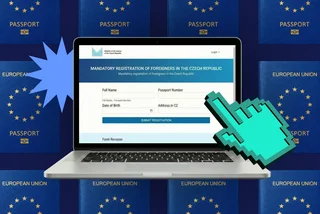Buying real estate in the Czech Republic is much less complicated than the red-tape era of the 1990s, but there are still a number of steps and potential legal hurdles that need to be cleared before you can call a property home.
The good news is that those initial basic steps are the same for everyone, foreigner or not. With help from a qualified real estate lawyer, you'll be more likely to close the deal with ease.
From searching the land register to signing a purchase contract here's everything you need to know about purchasing a home in the Czech Republic.
Determine whether you can legally purchase property

The restrictions that foreigners faced buying real estate in the 1990s ended when the Czech Republic joined the European Union on May 1, 2004. Foreigners with a residence permit and people who have been granted asylum can now buy property without having to go through a lot of legal red tape.
For EU citizens, most banks simply require temporary residence and a Czech rodné číslo — no additional rules usually apply and income from EU countries is accepted. Non-EU citizens can also purchase property in the Czech Republic.
More good news for potential homeowners: the 4 percent tax on real estate acquisitions was canceled on Sept, 26, 2020, with retroactive effect to December 2019. And compared to many other countries, the annual tax on real estate is relatively low, often on the order of just several thousand Czech crowns for a house in a major city.
Check the land register

Once you've qualified for financing and have found a property to buy in the Czech Republic, checking on your chosen property in the real estate cadastre records is the most important first step.
To verify the data provided to you by the seller, you will need to know the cadastral area and municipality where the property you have selected is located, as well as the ownership number (LV) under which it is registered.
The cadastre is the Czech Republic’s central real estate register where you can find data on all types of real estate, whether it is land, a house or an apartment. The Real Estate Cadastre contains very important information about the property owner, restrictions related to the real estate and other’s rights to the property.
The Real Estate Cadastre is open to the public, so you can view it in person or online. An official statement from the Real Estate Cadastre costs money, but the fee is about CZK 100.
If you enter the necessary data in the Real Estate Cadastre, you can check who the owner is, whether or not the real estate is subject to foreclosures or pledges, and even whether the real estate is the subject of legal proceedings.
In general, what is registered in the Real Estate Cadastre is valid. In some cases, however, it is important to keep in mind that the listing does not necessarily agree with the actual situation. This could cause you problems.
Clear any joint property or ownership issues

If you are buying property from an owner who is married, but the property is registered in the Real Estate Cadastre as a property that isn’t part of the spouses’ joint property, it is necessary to find out why. In general, movable and immovable property acquired during the marriage is part of the spouses’ joint property (with a few legal exceptions).
An exception may be, for example, inheritance. So if you know that the property owner is married, but the house you want to buy is not registered in the Real Estate Cadastre as part of the spouses' joint property and in addition only one of the spouses is listed as the seller, it is absolutely necessary to find out more details about the acquisition title for the real estate.
This is definitely a common practice, and you don't have to feel guilty about seeking such information. The aim is to rule out a situation where one spouse will later claim the purchase contract was invalid by saying that the house was part of the couple’s common property and was sold without their knowledge.
Verify the zoning plan and documentation

In the Real Estate Cadastre, you can check the legal status of the real estate. You should also ask the owners for project and construction documentation for the purchased house to rule out that the house was built in violation of the project documentation, or even that it is not approved for housing at all.
You should also go to the Building Office and check the zoning plan to see that the construction of a shopping center or even a landfill is not planned in the near future in a beautiful green area in front of your house.
You should also verify who owns the access road at the house. If it is owned by the municipality, everything is fine. If it is co-owned by homeowners, the situation is trickier. The access road must be maintained by its owner. If you are a co-owner, it is up to you and the other co-owners to take care of the road at your expense.
Review the purchase contract with a lawyer

The most important document is the purchase contract, or the so-called future purchase contract and the contract on custody of the purchase price. You must to turn to an experienced lawyer who will be able to advise you on what to look out for.
Remember that a real estate agency, while it may be at its best, is primarily motivated by the sale of real estate and commissions. The agency has no responsibility for the content of the contract you have signed.
Real estate is not a negligible investment, so it is definitely better to be sure that even if there is a snag in the implementation of the transaction, the contract won’t cause you to lose money.
The most important parts of the contracts are those that deal with what happens if an unexpected event occurs. The buyer must be sure that the purchase price will be paid to the seller only when the buyer is registered as the owner in the Real Estate Cadastre. The buyer must also be sure that the contract will include the seller’s liability for any defects in the property that the seller did not point out.
Proceed to checkout

If you do not buy a house from your savings, but instead draw a loan, the situation becomes more complicated because the bank enters into the transaction with its claims for the mortgage of the property, which secures your loan obligation. If the previous owner also drew a loan, you will need to oversee the deletion of their lien.
And if you are buying the house with your own money, there is a limit on how much cash you can spend. Any purchase over CZK 270,000 (EUR 10,000) in the EU must legally be done via a bank transfer.
Remember that it is better to spend more time on verifying the details of the property and preparing the contract than to rush everything and succumb to pressure from the seller. You could find yourself in a situation where a problem arises, and resolving everything in court will take several years.
Are you planning on buying real estate in the Czech Republic? LN Law Office Prague, founded by Mgr. Lucie Martin-Nešporová, offers expertise in real estate and other aspects of law in spoken and written Czech, French, and English as well as communication in German and Russian.












 Reading time: 6 minutes
Reading time: 6 minutes 


















